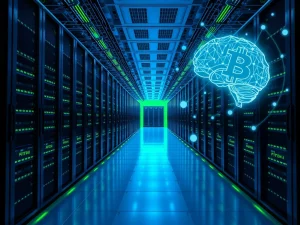Unveiling the Truth: David Sacks Debunks Overhyped AI Job Loss Fears in Crypto

The rapid advancement of artificial intelligence (AI) has sparked a global conversation, particularly concerning its potential to reshape the job market. While many predict widespread displacement, a prominent figure in the intersection of technology and policy offers a contrasting view. David Sacks, often dubbed Trump’s crypto-AI tsar, has boldly declared the notion of mass AI Job Loss as ‘overhyped.’ This perspective offers a crucial counter-narrative to the prevailing anxieties, particularly relevant for those navigating the dynamic landscape of cryptocurrency and blockchain technology.
Understanding David Sacks’ Stance on AI Job Loss
David Sacks, a well-known venture capitalist and a key advisor on AI and crypto within political circles, has taken a firm stance against the prevailing narrative that AI will decimate human employment. His argument centers on the idea that while AI is incredibly powerful, it still requires significant human oversight and input to generate true business value. Sacks emphasizes that AI excels at ‘middle-to-middle work,’ handling repetitive, data-intensive, or analytical tasks, but humans remain indispensable for managing ‘end-to-end processes.’
In a recent post on X, Sacks elaborated that AI needs to be prompted, guided, and its outputs verified by humans. This human element is critical for ensuring accuracy, context, and strategic alignment, preventing AI from simply producing outputs without real-world application. For the crypto industry, this means that while AI might automate aspects of data analysis, smart contract auditing, or customer support, the strategic vision, ethical considerations, and complex problem-solving will remain firmly in human hands.
The Insights from a Microsoft AI Study
Sacks’ comments come in the wake of a significant Microsoft AI Study that has fueled much of the discussion around AI’s impact on jobs. Researchers at Microsoft analyzed an extensive dataset of 200,000 anonymized Microsoft Bing Copilot chats to understand real-world AI usage. Their findings revealed that AI is predominantly applied to tasks involving information gathering, writing, advising, and teaching.
The study went further, assessing how effectively AI could complete specific tasks and assigning an ‘AI applicability score’ to various roles. This score indicated the degree to which AI could perform a job’s core functions. The roles identified as most susceptible to AI integration, or potential replacement, included knowledge-based occupations such as:
- News Analysts
- Reporters
- Journalists
- Technical Writers
- Customer Service Representatives
These roles received applicability scores ranging from 0.38 to 0.39, suggesting a moderate to high degree of AI influence. Interestingly, more data-driven roles like market research analysts and data scientists were on the lower end of the spectrum (0.35 to 0.36), perhaps because their work often involves nuanced interpretation and strategic thinking that AI is not yet adept at.
Implications for Crypto Industry Jobs
The findings of the Microsoft AI Study have direct implications for Crypto Industry Jobs. Many roles within the blockchain and cryptocurrency space mirror those identified as being at risk. For instance:
- Crypto Journalists and Content Creators: Just like traditional journalists, those who report on crypto news, write articles, or create educational content might find AI tools assisting significantly with research, drafting, and even generating initial content. However, the human touch of unique insights, narrative crafting, and critical analysis remains paramount.
- Blockchain Customer Service: With the increasing adoption of crypto, customer service representatives handling inquiries about wallets, transactions, or decentralized applications could see AI chatbots and automated systems taking on routine queries, freeing human agents for more complex issues.
- Technical Writers for Web3 Protocols: AI can help generate documentation, code explanations, and user guides for complex decentralized applications, streamlining the process but still requiring human experts to ensure accuracy and clarity for the highly technical and rapidly evolving Web3 space.
While these roles might experience transformation, it’s more likely to be an augmentation rather than outright replacement. Professionals in the crypto space will need to adapt, learning to leverage AI tools to enhance their productivity and focus on higher-value tasks that require human creativity, empathy, and critical judgment.
Balaji Srinivasan’s Perspective: AI as an Enabler, Not a Replacer
David Sacks’ viewpoint resonates with that of other prominent tech figures, including former Coinbase CTO Balaji Srinivasan. Srinivasan famously argued that ‘AI doesn’t take your job, it lets you do any job.’ This provocative statement suggests that instead of fearing job displacement, individuals should view AI as a powerful tool that democratizes access to skills and knowledge, enabling people to perform tasks previously beyond their reach.
Srinivasan posits that ‘Today’s AI is not truly agentic because it’s not truly independent of you.’ This means current AI models lack genuine autonomy and intent; they are sophisticated tools that respond to human prompts and directives. They enhance human capability rather than replacing it entirely. He further illustrates this by stating, ‘If it replaces anything, it’s the job of the previous AI.’ For example, GPT-4 replaced GPT-3, and Midjourney took Stable Diffusion’s ‘job.’ This highlights the rapid iteration within AI development, where newer, more capable models supersede older ones, but the fundamental human need for AI-powered assistance remains.
This perspective encourages a shift in mindset: instead of fearing AI, professionals in the crypto and tech sectors should embrace it as a co-pilot, a powerful assistant that amplifies human potential. This collaboration can lead to unprecedented levels of innovation and efficiency.
The Broader AI Impact on the Economy and Job Market
The debate around AI Impact on the job market is not confined to the tech and crypto spheres. Broader economic data often paints a mixed picture. The US Department of Labor reported a lower-than-expected 73,000 new jobs added in July, falling short of estimates. Similarly, crypto-specific job boards like CryptoJobsList.com and Remote3.co showed modest additions of 38 and 69 positions respectively in July.
While these numbers might appear concerning, attributing them solely to AI is an oversimplification. Economic cycles, market conditions, and regulatory environments also play significant roles. The reality is that AI is likely to cause a shift, rather than a catastrophic loss, of jobs. This shift involves:
- Job Transformation: Existing roles will evolve, requiring new skills and a deeper understanding of AI tools.
- New Job Creation: The development, deployment, and maintenance of AI systems will create entirely new categories of jobs, such as AI trainers, prompt engineers, AI ethicists, and AI integration specialists.
- Increased Productivity: AI can boost productivity across industries, leading to economic growth that may, in turn, create more demand for human labor in other areas.
For the crypto industry, the integration of AI could lead to more efficient blockchain development, enhanced security protocols, sophisticated trading algorithms, and personalized user experiences, opening up new avenues for employment in these specialized areas.
Navigating the AI-Driven Future: Actionable Insights
Given the nuanced discussion around AI Job Loss and its potential AI Impact, what can individuals and businesses do to thrive in this evolving landscape? Here are some actionable insights:
- Embrace Continuous Learning: The most crucial step is to commit to lifelong learning. Understand how AI tools work, experiment with them, and identify how they can augment your current role. Online courses, workshops, and industry conferences are invaluable resources.
- Focus on ‘Human-Centric’ Skills: Skills that AI struggles with – creativity, critical thinking, emotional intelligence, complex problem-solving, ethical reasoning, and inter-personal communication – will become even more valuable. Develop these ‘soft skills’ alongside technical proficiency.
- Become an AI Integrator: Instead of fearing AI, aim to become someone who can effectively integrate AI into workflows and strategies. This involves understanding both the capabilities and limitations of AI.
- Explore New Opportunities: Keep an eye on emerging job roles related to AI. The crypto space, in particular, will see a demand for professionals who can blend blockchain expertise with AI knowledge, such as AI-powered DeFi protocol developers or AI-driven NFT marketplace strategists.
- Advocate for Responsible AI: Engage in discussions about the ethical implications of AI. As the technology matures, ensuring fair, transparent, and unbiased AI systems will be paramount, creating roles for those focused on AI governance and ethics.
Conclusion: A Nuanced Outlook on AI and Employment
David Sacks’ assertion that AI Job Loss is ‘overhyped’ provides a much-needed perspective in a world often consumed by technological anxieties. While the Microsoft AI Study highlights specific roles that AI can significantly influence, the overarching message from Sacks and Balaji Srinivasan is one of augmentation, not outright replacement. The AI Impact on Crypto Industry Jobs, and indeed the broader economy, is more likely to be transformative, leading to the evolution of existing roles and the creation of entirely new ones.
The future of work will involve a symbiotic relationship between humans and AI, where AI handles the heavy lifting of data processing and repetitive tasks, allowing humans to focus on innovation, strategic thinking, and the uniquely human aspects of work. Those who adapt, upskill, and embrace AI as a powerful collaborator will be best positioned to thrive in this exciting new era.








